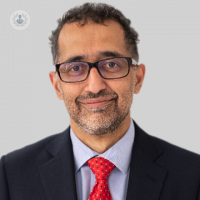Chest pain: symptoms, causes and what to do if you think it is a heart emergency
Written by:Experiencing chest pain can be frightening, and it’s definitely not something you should ignore. However, there can be many causes, some of which more serious than others.
We spoke to Dr Iqbal Malik, a leading consultant cardiologist based at One Welbeck Heart Health and London Cardiovascular Clinic on Harley Street, to understand more about the symptoms and causes of chest pain and what you should do if you think it might be a heart emergency.

Where in the chest might pain occur?
Pain in the chest can occur pretty much anywhere from your navel (which is really in the abdomen) up to your chin. It can have many causes including indigestion, lung problems and heart conditions. Obviously, we worry if the pain is coming from the heart. Classically, heart pain or angina is a central chest pain that can sometimes go into your arm, neck, jawline and teeth.
What are the symptoms of chest pain?
Chest pain is a symptom in itself, but if it's associated with nausea, breathlessness and/or a feeling of becoming very unwell or sweating, then that causes more concern. It's not just the severity of the pain that might be causing the symptoms, it may actually be indicating it's a problem with your heart.
How does ‘normal’ chest pain differentiate to heart attack pain?
Having chest pain of course is not a normal thing. If chest pain comes on at rest, is severe and associated with symptoms of breathlessness, feeling sweaty, nausea, and maybe even vomiting, or if it goes towards your arm, teeth or jaw, then it sounds like it might be a heart attack. In this case, you should seek urgent medical attention.
What are the possible causes of chest pain?
The body is very complex and there are many organs in your chest; any of which can cause pain. It could come from:
- your heart due to a heart attack or inflammation around the heart
- your lungs caused by an infection or even a collapsed lung
- your stomach due to indigestion
- your ribs and cartilages causing musculoskeletal pain
What are some common non-cardiac causes?
If chest pain is not coming from your heart, it could be coming from your muscles. You may have sprained one of your rib muscles and because you're using it to breathe all the time, it can result in pain. This could be caused by an injury and it's bruised your ribs, causing musculoskeletal pain.
More commonly, it could be acid reflux that can cause a burning feeling in the centre of your chest and not just in the stomach. Furthermore, it could also be coming from the lungs: Classically, pleurisy is a very sharp pain that can come in both viral and bacterial infections related to pneumonia. Occasionally, we've been fooled with a case of shingles, as this infection can cause a neurological pain that can come across the chest and feel like a band.
Ultimately, there are many different causes; only some of which are from the heart.
When is chest pain a medical emergency and what should I do?
It's always a tricky question to know when you should take your chest pain seriously and when you can safely ignore it. So, my rules usually are that if you feel it's very severe and on a scale the pain is 10 out of 10, then there's probably a reason to get that assessed quickly. If you are very sweaty, nauseated and/or vomiting with it, again, it's worth taking that seriously, even if it turns out to be a bad case of indigestion.
Of course, the worry with very severe pain is that you've got either a tear in a blood vessel, which can cause an excruciating pain in the chest that goes to the back, or you're having a heart attack which bizarrely sometimes doesn't cause severe pain, but just makes you feel a bit breathless or uncomfortable.
So, if you're worried about a pain anywhere between your navel and your chin and it's unexpected, lasting more than 20 minutes to half an hour and it's making you feel unwell, you should take it seriously and get medical attention.
In the UK, we're blessed to have a very good ambulance service. So, calling 999 and declaring you've got chest pain - certainly where I work in London - will get an ambulance to you probably within about eight minutes. They can then assess whether you need to go to the hospital or not.
What should I do while waiting for the ambulance?
When you're at home waiting for the ambulance to arrive, it's good to have someone with you in case something more serious occurs. Even if they don't know how to do any CPR or breathing exercises, it’s important to have someone there who can at least lie you on your side if you collapse.
Should I take aspirin in case it’s a heart attack?
If you have had heart trouble before and you've stopped taking your aspirin, by all means, take one unless your doctor told you not to for some reason. If you've never had heart troubles before and you have central chest tightness, then there's no harm in taking the usual 300-milligram headache dose in case it is a heart attack. It is a very simple but effective treatment before the ambulance crew get there.
Of course, if you're vomiting blood at that time, it very likely means you're not having a heart attack and it’s something in your stomach. In this case, taking aspirin is not a good idea.
The bottom line is to make sure you have someone with you and call for help. If you are a heart patient and you think the pain might be caused by your heart and not your stomach, then take an aspirin.
Dr Iqbal Malik is a consultant cardiologist based at One Welbeck Heart Health and London Cardiovascular Clinic on Harley Street. To book an appointment or e-Consultation with him, go to his Top Doctors profile.


